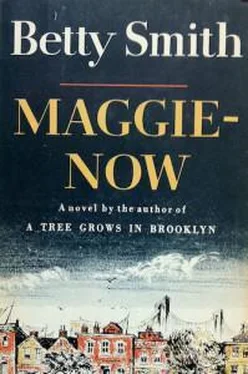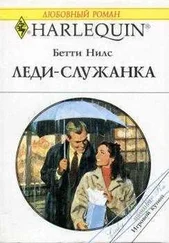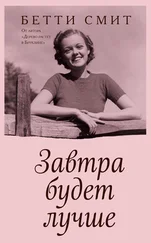Бетти Смит - Maggie-Now
Здесь есть возможность читать онлайн «Бетти Смит - Maggie-Now» весь текст электронной книги совершенно бесплатно (целиком полную версию без сокращений). В некоторых случаях можно слушать аудио, скачать через торрент в формате fb2 и присутствует краткое содержание. Жанр: Проза, на английском языке. Описание произведения, (предисловие) а так же отзывы посетителей доступны на портале библиотеки ЛибКат.
- Название:Maggie-Now
- Автор:
- Жанр:
- Год:неизвестен
- ISBN:нет данных
- Рейтинг книги:3 / 5. Голосов: 1
-
Избранное:Добавить в избранное
- Отзывы:
-
Ваша оценка:
- 60
- 1
- 2
- 3
- 4
- 5
Maggie-Now: краткое содержание, описание и аннотация
Предлагаем к чтению аннотацию, описание, краткое содержание или предисловие (зависит от того, что написал сам автор книги «Maggie-Now»). Если вы не нашли необходимую информацию о книге — напишите в комментариях, мы постараемся отыскать её.
Maggie-Now — читать онлайн бесплатно полную книгу (весь текст) целиком
Ниже представлен текст книги, разбитый по страницам. Система сохранения места последней прочитанной страницы, позволяет с удобством читать онлайн бесплатно книгу «Maggie-Now», без необходимости каждый раз заново искать на чём Вы остановились. Поставьте закладку, и сможете в любой момент перейти на страницу, на которой закончили чтение.
Интервал:
Закладка:
ordinary boy. She showed Lottie the snapshot when she visited her.
"His face is a open book," said Lottie.
Yes, thought Maggie-Now, and his life is an open book.
She knew all about him: she knew his father, she knew what their business was, what their background was. She knew where he lived and where he had come from. She knew of his sister and his brothers and the girl he used to go with. She knew he had graduated from Boys' High and that he was a Catholic.
She knew nothing about Claude.
Yet. .
Sonny wrote, after he'd been in the army for two months, that his next letter might come from a different address.
I can't tell you anymore than that, but if I come back all in one piece, will you be my girl?
She was touched. Be my girl was tantamount to saying: Become engaged to me and we'll marry. .
She found it hard writing an answering letter. She was a fairly direct person and it was always easier to say yes or no rather than maybe. But now she couldn't say yes, and she didn't want to say no.
Any girl would be proud to be your girl, she wrote. (But she couldn't write: I'll be proud to be your girl.
I'll see, she wrote, meaning she'd think it over. (She couldn't write: I've made up my mind.)
His answer came three weeks later.
I'm tickled to death you didn't say no. I'll wait and I'll keep my fingers crossed.
The letter came from overseas.
She looked forward to getting Sonny's letters and she enjoyed answering them. He kept pressing her for a decision.
. . we'll be moving up soon and it would mean a lot to me if I knew. . [And] P.S. If you run into Father Flynn, tell him our chaplain, Father Newsome, said he went to college with him and I forgot to say, don't worry if you don't hear from me in some time.
t254] She started to worry immediately. As soon as she'd finished reading the letter, she went to church and lit a candle and prayed for his safety. She saw Father Flynn outside the church and told him about the chaplain.
A longing, faraway look came to Father Flynn's face as he said: "Oh, yes. Freddy! The best end the school ever had. It seems so long ago."
He told her how pleased he was with the Thursday-night socials in the church basement. Sometimes there were as many as twenty yotmg people attending. He told her he had ten new player rolls for the pianola.
"I went from door to door begging for rolls old and new," he said.
"But, Father, we were going to appoint a committee to go out and get donations…."
"I couldn't wait that long. I got so sick and tired of hearing 'The Oceana Roll.'" He paused. "I've heard there was some criticism about using the church basement for the socials. I've heard that some of our parishioners are against them."
"There are always a few people against things," she said.
"But I heard that people think they're a good thing. They bring young people together."
He looked at the letter in her hand. "Yes, they do, don't they, Margaret?" There was a twinkle in his eye. He put two fingers on the letter as though blessing the sender.
"He's a good boy, Margaret."
"Yes, he is, Father. But. ."
He remembered the way she had looked at Claude that Easter morning when they came out of the church.
"He is a good man," he said firmly. "Pray to our Holy Mother for guidance."
"Yes, Father."
She prayed long and hard and sincerely and then wrote to Sonny. She wrote: Maybe. .
It was some weeks before she got his answer.
[ENS]
~ CHAPTER THIRTY-FT VE ~
WAR IS a terrible thing, people kept telling each other, but just the same, they admitted, it sure made things exciting for the people at home. There was w ork for all and salaries were high and luxuries were available to all.
The conservative haberdashery on Grand Street was forced to stock men's silk shirts for the first time in its long history. Workmen bought them.
Before the war, women had worked as factory hands, store clerks, waitresses, telephone operators, typists, cashiers, housemaids and so forth. Those with more specialised training could put their names on waiting lists for teachers, librarians, nurses, private secretaries, and wait around for an opening.
Now, most all jobs were open to them. They worked as trolleycar conductors, operated elevators, drew beer, worked milk delivery routes, replaced men in the post offices, wore cute uniforms and worked down at the Brooklyn Navy Yard and were called ycomanettes. Men stopped giving them their seats in the subways.
They wore pants. Since pants made expressly for women were not available, they wore their brothers' pants. They discarded high shoes and wore oxfords with spats. They invaded barbershops and had their hair cut short. They stopped pinching their cheelcs to make them red. They used rouge. They took to smoking cigarettes. Like men, they argued over politics. The time was drawing near when they'd be allowed to go to the polls to vote.
In short, they were freed at last and they had a hell of a time.
The war was good for real estate, too. The "Rooms for Rent" signs disappeared from the windows and prospective tenants gave landlords a "bonus" for first chance on a vacant flat. People sA: ho lived in hall bedrooms now could afford a flat; flat renters [2S6 1
moved to apartments and apartment dwellers moved to little houses out on the Island that they could buy for so little down and so much time to pay, small additional charge for built-in breakfast nooks.
Landlady Maggie-Now Moore profited. The contentious Heahlys had moved away, owing thirty dollars back rent, leaving a broken-back chair and a gentleman roomer in the hall bedroom. Maggie-Now had believed the woman's story that the man was a brother-in-law who was "staying"
with them for a while because his wife had just "passed away."
The gentleman didn't move away with the Heahlys because he had paid two months' advance rent on the hall room. No, he wasn't a relative of theirs, he told Maggie-Now, but it was true that his wife had died recently. She left a two-year-old son, he said, who had been placed in a "home," and he paid the home five dollars a week, until he remarried. Yes, there was a widow, he confided to Maggie-Now; they'd marry after the decent interval of a year from his wife's death. He was marrying again so his child could have a home and mother.
Oh, if he'd only let me keep the baby here, instead of that place,?mtil he married. I'd be so happy to have that baby, she thought.
I wish l had the nerve, he thought, to ask her to board the boy for five dollars a week. I could have him every night and she's so nice….
But he didn't ask and she didn't ask.
He continued renting the room for ten dollars a month and Maggie-Now rented the rest of the place to an eager family who paid twent`TT-five dollars a month rent for it.
Now she collected thirty-five dollars a month in rent, instead of fifteen. Taxes remained the same and the surplus in the bank account grew.
She used some of the money for herself. She bought a sheer georgette crepe blouse and a lacy camisole to show through and a tight skirt and high-heeled slippers. She wore silk stockings now, instead of lisle.
She still ran the Thursday-night church socials. She was popular with the boys someone always walked her home.
The girls liked her, too. Some of the girls had their hair bobbed. They urged Maggie-Now to have hers cut.
Читать дальшеИнтервал:
Закладка:
Похожие книги на «Maggie-Now»
Представляем Вашему вниманию похожие книги на «Maggie-Now» списком для выбора. Мы отобрали схожую по названию и смыслу литературу в надежде предоставить читателям больше вариантов отыскать новые, интересные, ещё непрочитанные произведения.
Обсуждение, отзывы о книге «Maggie-Now» и просто собственные мнения читателей. Оставьте ваши комментарии, напишите, что Вы думаете о произведении, его смысле или главных героях. Укажите что конкретно понравилось, а что нет, и почему Вы так считаете.












